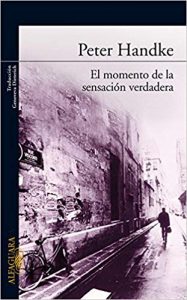There are authors whose work you must certainly be sure you want to read. And picking up a book under reading conditions or premises is not usually the best start for an adventure on paper. Unless you come across something exceptional such as the work of Peter Handke.
I say this because this Austrian writer, who came to the novel as one more aspect of the multifaceted creator, appears with his band of pessimism turned into literature. Also, Handke is sometimes sophisticated in form, but ultimately he is an extremely interesting storyteller. His literature is a sincere emptying, that of each of his characters with rhythms escaped from his plays or scripts.
If we mix conscientiously Kafka y cioran, we find a Handke that, in the dizziness of the cocktail, offers a multitude of surprising nuances. A kind of narrative download about characters abandoned to the fate of everyday life, once they get off the boards on which they act. Including himself as the first voice that exposes his life experience and his ideas about the world.
Handke or any of his other characters, reconverted into ourselves with our thoughts, sifted by the symbols of dreams that, with their usual character of clues without clear sense, end up marking the future of our behavior. We are warned that Handke is not the joy of the garden. And it is not that the action of his works move us through fast-paced plots. Despite everything, his literature captivates.
Handke's novels and almost fictionalized writings ooze that pessimism of loneliness. Even so, we return to enjoy, as soon as we take the point to the sum of sad characters, of that journey to existentialism punctuated by that addition of the fantastic that is born from the dreamlike and even the insane.
3 recommended books by Peter Handke
Essay on fatigue
Since Handke's novelistic intention passes through a philosophical intention around the character, his non-fiction part is not so far from his fictional aspect.
Every essay points to the most transcendental soliloquy, to the exposition of ideas linked to the rational projection on moral, ideological or any other referents from which the author on duty is capable of constructing this work of principles, of an initiatory journey.
On this occasion, tiredness happens to be an excuse from which to address that fatalism, defeatism that makes us all losers from our reason incapable of addressing the finitude of everything, starting from our own conscience locked between bones.
It is not an easy book, as you can imagine, but its symbols, well digested after careful reading, end up providing brilliant existential notions. The tiredness of living for a rational being always searching for answers in a world built from the most absolute relativity, is exhausting for Handke.
And yet, the magic of the thought experiment toward that derived dissatisfaction creates a space of freedom that is as distressing as it is gratifyingly explorable.
Unrelenting misfortune
Another of the great works rescued for today. Because if Handke's works have been republished recently it is because his thought extended towards a space between fiction (as a personal sphere of the writer himself), and the realism typical of a work soaked in the rawest experiences exorcised in the literary, ends for turning Handke himself into a universal character, a hero of survival who narrates his own impressions fragmented between dreams, experiences, reflections and rich notions of existentialism offered as experience.
The title of this work points to that aspect of the irreversible that is death. Perhaps an exit from the scene like the one his mother had, with that disenchantment with suicide, even marked by beliefs and religions as an assignment to the devil, would be for Handke one of the most powerful engines to vomit that anguish of absences with weight that they can sink those who support them. And that in any case they are always that shoulder load from which the author can never get rid of.
The moment of true sensation
The awakening, addressed with that international literary recognition in Kafka's Gregorio Samsa. In the case of this novel by Handke we discover a kind of day after from a dream that points to a self-fulfilling prophecy. The powerful sensation of Keuschnig's dream, in which he has discovered himself capable of murder, magnetizes him in everything he does afterwards.
A simple dream, nothing of this world, an incomprehensible download of reason in its night's rest. And yet, for Keuschnig, nothing will ever be the same. Paris, the city in which he works fulfilling a comfortable and recognized political mission, is losing its light for this unfortunate man capable of submerging himself in his own dream. Everything that happens since that awakening points to catastrophe.
The only possibility for Keuschnig is to recover the world from the vision of childhood, a time in which dreams could have monsters, but in which one could never end up becoming the monster, the murderer...




3 comments on “The 3 best books by Nobel Prize winner Peter Handke”